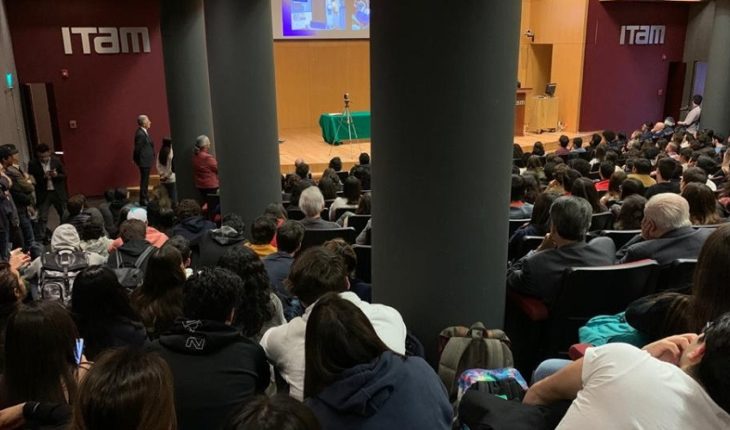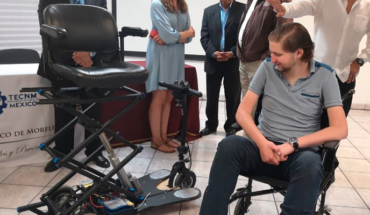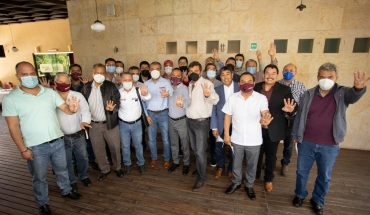THE ITAM on Monday implemented a questionable suicide prevention activity after, on February 11, student Gerardo Ernesto Carreón Olvera – whom the institution does not recognize as an active member even though the mother claims to have committed suicide.
The first activity, scheduled for 10 a.m. on Monday, was a conference in which they assured young people that suicide is a global trend, triggered by modern life and technology. There was even talk of challenges like the Blue Whale and Momo, but nothing was said about the excessive academic pressure that students reported on social media last December, which led to criticism from students.
Last December Fernanda Michua Gantus, a student of ITAM’s law and international relations degrees, died. The news that his death had been a suicide was initially spread, caused by excessive academic pressure at the institution. The young woman later explained that she had died from an epileptic seizure, but noted that she had presented after Fernanda failed an examination. The young woman’s death slashed on social media a wave of complaints from her peers about the stress of school workload and the overbearing and unempathetic attitude of some teachers.
Find out: Family accuses it’s pressure from ITAM causing Ernesto’s death; is an alumnus, says the school
On 14 December, ITAM issued a statement committing to meet demands and implement a strategy that included the creation of the new Directorate of Student Affairs, with Horacio Vives at the helm. It is focused on providing care and stress management and addiction prevention initiatives. It also offered a free and professional emotional care service, promoting an environment of respect and direct access for students to the rector and vice-chancellor.
“Yes things have been done, the Student Affairs Directorate was created, and Vives is a very close person to the students, but there are also signs that it puts the interests of the school ahead and not of us. In addition, he is not a mental health specialist and the psychological support services offered are not sufficient in the face of the demand that exists. A colleague was given an appointment for February 28th and when you are in an emergency situation and risk that’s a long time,” a student who asked to omit his name, and whom we will call Peter, told Animal Politician.
The young man, a law student, explained that a mental health clinic was also opened, which is an elective subject, open to all students interested in taking it.
Regarding the teachers, he said that they did fire some who had abusive conduit signs towards students. “But not all those who have these behaviors are gone, several are still in the institution.”
On February 11, Gerardo’s mother Ernesto Carreón Olvera reported that her son had taken his own life because of academic pressure at ITAM. The institution rushed to issue a statement assured that the young man was not his student. “He didn’t sign up this semester. He took an exam in January for the exams that were postponed in December but he is not an active student,” the communication office told Animal Político.
In the face of this, the announcement of the new phase of the strategy was made. In front of a crowded auditorium, with young people sitting even on the steps of the compound and others following the conference remotely in rooms enabled for this, Ana María Chávez, of the Mexican Association of Suicidology, gave a talk in which she stressed that suicide is a global problem accentuated by technology.
“It’s a new world, a new stage and a new contemporary guy that impacts these suicide cases. And in Mexico the problem has become more pronounced because the most at-risk population group, aged 10 to 29, is growing,” he explained at the conference to which Animal Político had access.
The psychologist presented cases of suicidal children, reported in the media, by punishment from their parents, for not being able to continue their studies. He stopped at online games such as the Blue Whale or Momo who challenges teenagers to commit suicide and even talked about what happened in Coahuila, where a child shot at his teacher and classmates. But he said nothing about the suicide cases at ITAM.
To close her speech, Ana María Chávez threw a question at the auditorium full of young people: “What would you do if any of your friends talked about taking their own lives? Your ability to recognize signs can make the difference between life and death. Knowing what to do involves informing us, having an intimate job, at home.”
In the Q&A session in which only three questions were allowed, a student took the floor to express his or her displeasure. “I don’t understand what just happened here. I came (to the conference) expecting some kind of empathy and what I find is that they blame the technological trends and even why you didn’t support it, how did you respond, and the ITAM what could have done?”
Another conference attendee pointed out that suicide cases at ITAM go beyond a social media issue or a hashtag: “These are specific problems that have to do with the academic situation in which we live, and the priority that studying at ITAM and our subjects are more important than our mental health and even physical it.”
In the face of the complaints, Chávez assured that this conference was just the beginning of the strategy, in which there will be one-time and individual interventions. He noted, for example, that at noon there would be a workshop with teachers to address the issue of how to act after a suicide in the community, known as post-invention, to avoid a domino effect.
He also announced a workshop for students in the afternoon and said that all this week there will be activities aimed at preventing suicide.
Members of the student performances approached Chávez and the ITAM authorities to request that a statement be sent announcing that there would be more actions, as many of the attendees had been disappointed in the conference.
And the school issued it, in this it the ITAM clarified that the conference was an initial talk of awareness raising with the aim of giving an overview of the social context, “we will continue to address the problems that we are going through, in different spaces to exchange reflections and feelings. This effort marks the beginning of what in our study house we will start to support you.”
The young man who during the round of questions recovered insensitivity to address the issue, told Animal Politician that ITAM authorities only act reactively in the face of these cases, “but not preemptively. They’re trying to wash their hands. It’s a problem that they seem not to understand and well I don’t take malice, maybe it’s the eagerness to give a quick response.”
Pedro points out that the problem is that ITAM, although it has implemented actions to prevent suicide, has refused to acknowledge its responsibility in the problem, “they do not want to admit that it is stress, excessive competitiveness as the immediate cause, that evades it, as they did at today’s conference, as they did when they came out to say that Gerardo was not a member of the community, when only in December he was as a student”.
In the evening, ITAM issued another statement in which it said that post-life and prevention workshops were held, where students and teachers shared their feelings and concerns.
Once the anxiety generated by such events was addressed and the specific context of the institution was analyzed, the multiplicity of risk factors that exist in such situations was identified and understood and some tips on how to try to avoid suicide were learned.
What we do in Animal Político requires professional journalists, teamwork, dialogue with readers and something very important: independence. You can help us keep going. Be part of the team.
Subscribe to Animal Politician, receive benefits and support free journalism.#YoSoyAnimal
translated from Spanish: Students accuse ITAM evading responsibility for suicide cases
February 18, 2020 |





